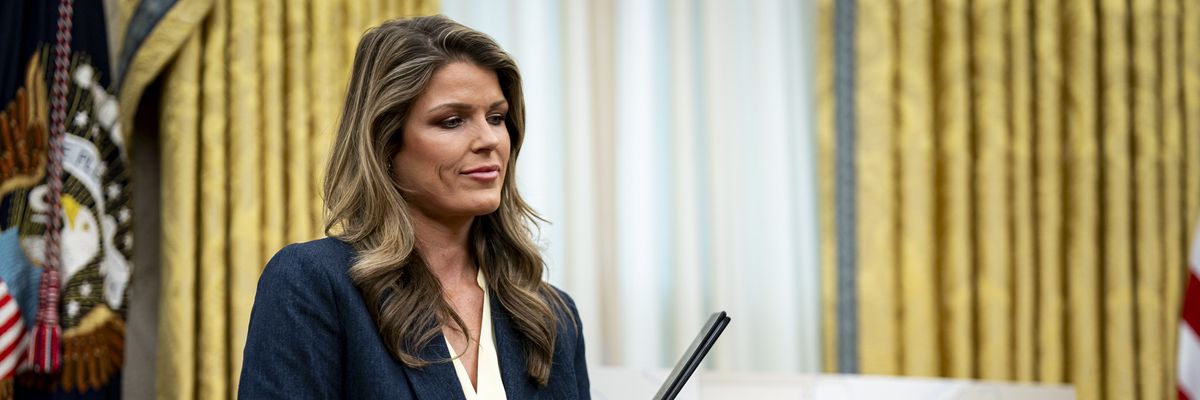The attorney handpicked to prosecute President Donald Trump's enemies may have "tainted the grand jury proceedings" against former FBI Director James Comey by making multiple false statements, said a federal judge Monday.
In a 24-page ruling, Federal Magistrate Judge William E. Fitzpatrick said that the Department of Justice (DOJ) engaged in a “disturbing pattern of profound investigative missteps” when moving to secure the indictment of the former FBI director in September, following a direct order from Trump to Attorney General Pam Bondi.
As a result, Fitzpatrick granted what he called an "extraordinary remedy," requiring all grand jury materials in the case, including audio recordings of the grand jury proceedings, to be made available to the defense. Typically, information from a grand jury indictment is kept secret until it is revealed at trial. But Fitzpatrick said the "unique circumstances" made it necessary to release it "to fully protect the rights of the accused."
The most glaring of these missteps were made by Lindsey Halligan, the interim US attorney for the Eastern District of Virginia. Despite being a former insurance lawyer who'd never prosecuted a criminal case, she singlehandedly brought the indictment before the grand jury, which accused Comey of lying to the Senate Judiciary Committee in 2020 about whether he authorized someone at the FBI to serve as an anonymous source in news reports regarding the bureau's investigation of Hillary Clinton.
Despite her lack of experience, Halligan—a former contestant in one of Trump's beauty pageants—was plucked from obscurity to serve as the interim US attorney for Comey's home district after Trump pushed out her predecessor, who refused to bring charges against Comey due to lack of evidence.
Comey and New York Attorney General Letitia James, another of Trump's enemies who Halligan has brought charges against, last week successfully got a different judge to hear their argument that Halligan was unlawfully appointed to her position.
Fitzpatrick said his decision to open up grand jury materials in the Comey case came in part because of two "fundamental misstatements of the law" made by Halligan, that he said "could compromise the integrity of the grand jury process" and potentially rise to the level of "misconduct."
Halligan asserted that Comey did not have the Fifth Amendment right not to testify, which Fitzpatrick wrote “ignores the foundational rule of law that if Mr. Comey exercised his right not to testify, the jury could draw no negative inference from that decision."
He also said that a separate statement made by Halligan, which remains redacted, "may have reasonably set an expectation in the minds of the grand jurors that rather than the government bear the burden to prove Mr. Comey's guilt beyond a reasonable doubt at trial, the burden shifts to Mr. Comey to explain away the government's evidence."
Fitzpatrick said the prosecutor also made the highly unusual argument that the grand jury did not have to rely solely on evidence presented in the government's indictment—which was a measly page-and-a-half long—to determine probable cause. Instead, Fitzpatrick said, Halligan suggested the jury "could be assured the government had more evidence–perhaps better evidence–that would be presented at trial."
That interpretation aligns with the criticism Fitzpatrick voiced at a hearing earlier this month, calling out the Trump DOJ's “indict first, investigate later” approach to these political prosecutions.
Fitzpatrick further suggested that Halligan and the DOJ violated the Fourth Amendment by relying on evidence sourced from FBI search warrants executed in 2019 and 2020 during a separate case against one of Comey's former attorneys, Daniel Richman, whom the indictment alleged was the source Comey authorized to speak to the media.
"Under long-standing Fourth Amendment precedent," Fitzpatrick wrote, "the government may search for and seize only those materials expressly authorized by the terms of a search warrant issued in connection with specific predicate offenses."
Fitzpatrick also wrote that an FBI agent called to testify before the grand jury may have exposed information subject to attorney-client privilege between Comey and Richman, which he called a "highly irregular and a radical departure from past DOJ practice."
"I have never seen a more scathing opinion, with this many errors, in any criminal case I have ever covered," said Sarah Lynch, who covers the DOJ for Reuters.
The order may result in the case being thrown out of court entirely before even getting to trial, and the DOJ would be unable to bring it again, with or without prejudice, as the statute of limitations has expired.
If it is found that Halligan was improperly appointed to her position, the case would also fall apart since she was the only attorney who signed the indictment, though Bondi has retroactively claimed she reviewed the document even though she never signed it. It would also potentially derail the case against James.
MSNBC legal analyst Glenn Kirschner said that "given today’s ruling... it’s becoming increasingly difficult to see how the indictment does not get dismissed."




